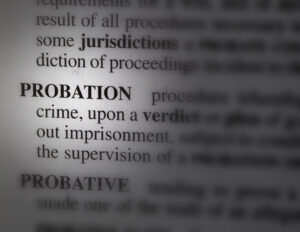
Violating probation can lead to serious consequences, but the specific outcome often depends on the nature of the violation and whether it’s a first offense. Most first-time probation violations result in one of three outcomes: a warning and reinstatement of probation, a modification of probation terms, or, in more severe cases, revocation of probation.
Here’s what you need to know if you’re facing your first probation violation. Contact Law Office of Michael L. Fell at (949) 585-9055 to request a free legal consultation.
What Constitutes a Probation Violation?
A probation violation occurs when a person, placed on probation after a conviction, fails to follow the specific terms or conditions set by the court. These terms can include:
- Abstaining from drug or alcohol use
- Performing community service
- Paying victim restitution
- Seeking gainful employment
Violations can range from failing to check in with a probation officer to committing a new criminal offense.
Possible Outcomes for a First Probation Violation
1. Reinstatement of Probation
For minor violations, judges may choose to reinstate probation under the original terms. This is often accompanied by a warning to comply with all conditions moving forward. Reinstatement is a common outcome for first-time violations that don’t involve new criminal activity.
2. Modification of Probation Terms
If the judge decides a stronger response is needed, they may modify the terms of probation to make them stricter. Examples of modifications include:
- Additional community service hours
- Participation in a treatment program
- Mandatory drug or alcohol testing
- Compliance with a restraining order
While this option increases the requirements for the probationer, it allows them to remain under community supervision rather than serving jail time.
3. Revocation of Probation
In more serious cases, such as when a new crime is committed, the judge may revoke probation altogether. This means the probationer must serve the remainder of their sentence in jail or prison. Revocation is typically reserved for severe violations or repeated offenses.
The Probation Violation Hearing Process
If a probation violation is suspected, the probationer will be required to attend a probation violation hearing. The process typically works as follows:
1. Evidence Presentation
The prosecutor presents evidence to prove the probationer violated a condition of their probation. Unlike a criminal trial, the burden of proof in these hearings is lower—"preponderance of the evidence" instead of "beyond a reasonable doubt."
2. Defense Response
The probationer or their attorney can present evidence or arguments to refute the claim of a violation. This may include demonstrating compliance or showing that the violation was unintentional.
3. Judge’s Decision
Based on the evidence, the judge will decide whether a violation occurred. If no violation is found, the probationer continues their probation as originally ordered. If a violation is confirmed, the judge will determine the appropriate consequence, which could include reinstatement, modification, or revocation.
Common Reasons for Probation Violations
First-time probation violations often result from failing to comply with one or more conditions of probation. Common violations include:
- Missing scheduled meetings with a probation officer
- Failing to pay court-ordered restitution or fines
- Testing positive for drugs or alcohol
- Not completing community service hours
- Failing to obtain or maintain employment
What to Do If You Face a Probation Violation
If you’re accused of violating your probation, it’s crucial to act quickly and seek legal assistance. A criminal defense attorney can help by:
- Reviewing the terms of your probation to identify potential defenses
- Gathering evidence to support your case
- Representing you at the probation violation hearing
- Negotiating for reinstatement or modification rather than revocation
Protect Your Future
A first probation violation doesn’t have to derail your life, but the outcome often depends on how the case is handled. At Law Office of Michael L. Fell, we understand the challenges probationers face and are committed to providing the strong legal support you need.
Contact Law Office of Michael L. Fell at (949) 585-9055 for a consultation to discuss your case and explore your options for resolving the violation. With the right representation, you can work toward minimizing the impact on your life and moving forward with confidence.

